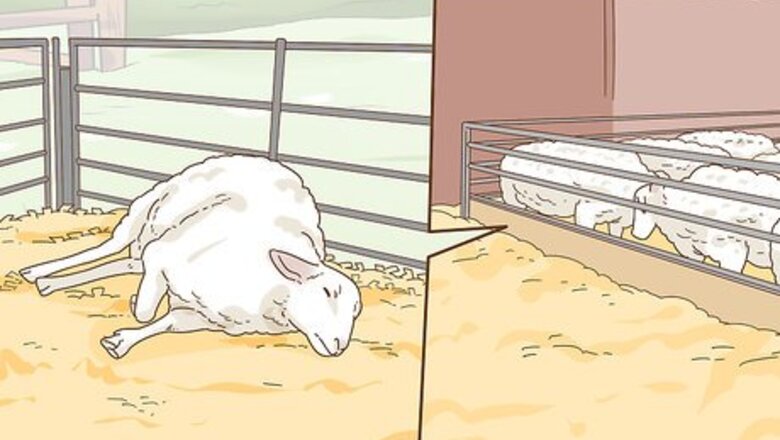
views
Treating a Sheep with Pneumonia
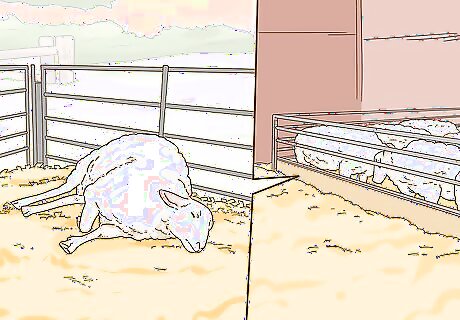
Remove the sick sheep from your herd. Pneumonia, in some cases, can quickly spread from one sheep to another and result in deaths. Take the afflicted sheep and put it in a quarantine separate from the rest of the herd, making sure they do not share grazing land, food, or water supplies. If you suspect your sheep might have pneumonia, watch out for symptoms such as lethargy, depression, loss of appetite (or the sheep being “off its feed”), and isolation from the rest of the flock. For recovery’s sake, place the sick sheep in a warm and dry environment. This will help it handle its symptoms better, as humid environments can exacerbate breathing problems and extreme temperatures can hinder recovery.

Call a vet to determine if it's viral or bacterial. The vet can test for pneumonia using a simple blood test that can identify the presence of certain pathogens in the blood, or they can use a chest x-ray. If the infection is viral, there are no medications to specifically help the pneumonia. However, your vet can provide an antibiotic that will help with the complications of the viral infection. A bacterial infection can be treated using antibiotic.
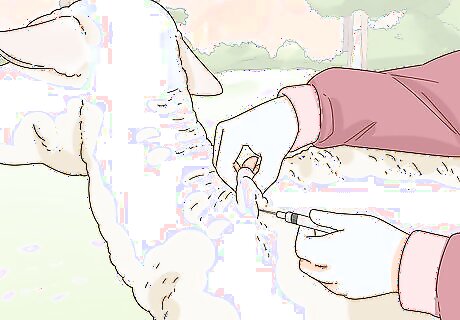
Give the sheep medications to help with symptoms. This is particularly critical in lambs. The most common types of medication given to sheep with pneumonia include Naxcel and Nuflor. These are both given as injections for 2 to 3 days consecutively or as directed. If you are injecting your sheep, choose a muscular area, such as the back of the neck, to give the injection. Make sure to sanitize the injection site prior and have help to hold the sheep in case it becomes frightened. If you’re not sure how to deliver an injection, have your vet show you how to do it while they are on the farm assessing your sheep. If your animal has a fever, give it an acetaminophen, such as Tylenol. Ask your vet about the proper dosage. You can give these orally in your sheep's food. If your sheep is not eating, your vet may give you a liquid or injectable form that can be forcibly administered.
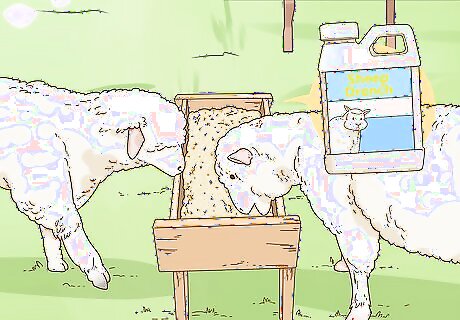
Feed your sheep proper nutrition to help with recovery. There are special vitamin mixtures given in addition to its normal diet that can give your sick sheep a boost, such as SheepDrench. These vitamin mixtures can be purchased at any feed store. You will also want to give them a probiotic paste to help promote good digestion while using antibiotics. Add soybean meal or beet pulp to give the food a burst of nutrition. In extreme cases, the sheep may stop eating altogether despite medications and need a feeding tube to be inserted in its stomach. Your vet will make this assessment. If your sheep is not drinking, make sure to give it electrolytes. If it has no interest in water, you can give an electrolyte mixture, purchasable at any feed store, through its mouth forcibly. It can be mixed into a syringe that can be squirted into the sheep's mouth, or put in a bottle for lambs.
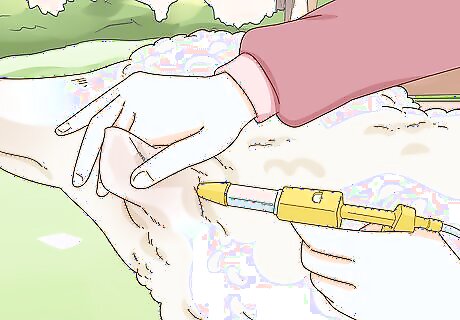
Test for and remove any parasites. Parasites can be a common cause of pneumonia. Sometimes bacteria from the parasite can spread into the tissues, further weakening the animal. An antibiotic treatment can help relieve this type of infection. Your vet can identify a parasitic infection using tests and observing symptoms, such as listlessness or diarrhea. These parasites are usually internal and require an injectable anthelmintic (antiparasitic) medication, such as Moxidectin or Ivermectin. The dosing is based on the weight of the animal and can range from 1 fluid ounce (30 mL) per 100 pounds (45 kg) or 1 millilitre (0.034 fl oz) per 10 pounds (4.5 kg).
Recognizing Symptoms of Pneumonia
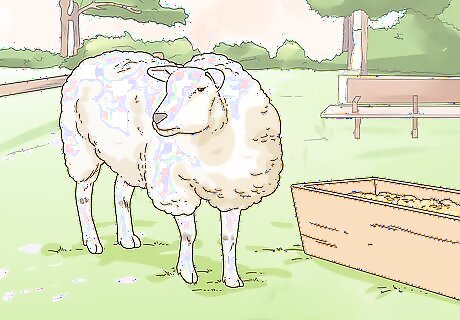
Look for changes in behavior. One of the earliest signs of pneumonia is a general listlessness, disinterest, and an overall dullness. This can particularly be seen in eating and drinking habits. If your sheep shows a general disinterest in eating, you'll want to keep an eye on it. Watch how your sheep interacts with the flock. If it is having trouble keeping up with and interacting with the rest of the flock, it may be coming down with an illness. You may notice it standing by itself, away from the flock.
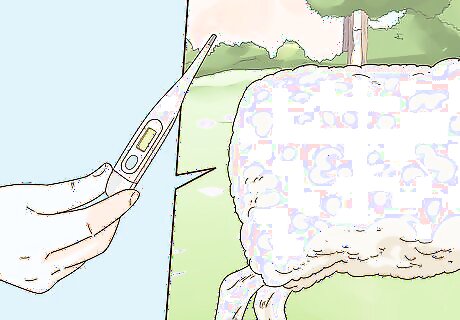
Take your sheep's temperature. Using a rectal thermometer, insert it into the sheep's rectum in the early morning before it has had time to engage in activity or be in the heat. Any temperature above 103 °F (39 °C) signals that your animal is likely ill. If you have never used a rectal thermometer, consult your vet or a friend so that you do not cause any damage to the animal.
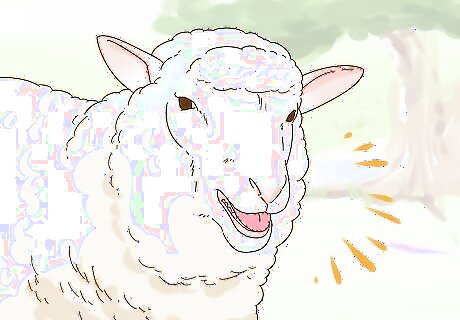
Listen for coughing and labored breathing. If your sheep is acting different and has a high temperature, you'll want to look for other common signs of pneumonia, like coughing. Sheep dealing with respiratory issues may cough and sound wheezy with labored breathing. It's normal for an animal to have quickened, labored breathing in hot weather, so make sure to take the setting and circumstances into account.
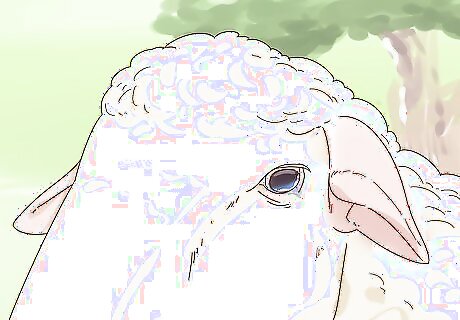
Look for eye or nose problems. Sheep with pneumonia may have a whitish discharge coming from their nose and water-filled eyes that appear to be weeping. Their eyes may also appear dry and sunken in some cases. In its more developed stages, the sheep may have a frothy discharge coming from its mouth caused by difficulty breathing.
Preventing Pneumonia

Talk to your vet about a vaccine. This is particularly the case if your herd has been dealing with ongoing issues with pneumonia. These vaccines are usually given 4 to 6 weeks apart and then another one annually. However, these can have limited effectiveness, and other means can also help prevent the disease from taking root in your flock.
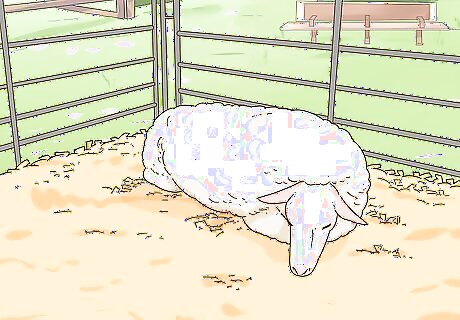
Keep the sheep's environment sanitary. Urine and feces can release gases that harm the respiratory tract, making pneumonia more likely. Also, wet bedding can cause the animal to become chilled and more susceptible to pneumonia.
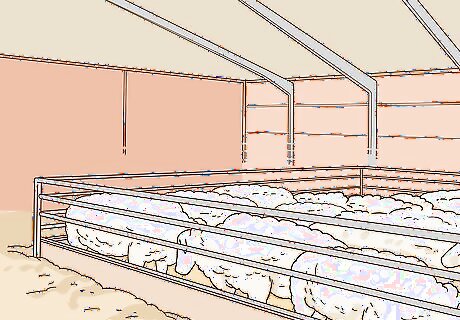
Keep barn temperature and humidity controlled. Sheep are fairly resilient and can tolerate some heat or cold, but avoid anything too extreme. If it is a chilly winter night, make sure that your sheep are in a barn that can provide some heat and shelter for them. Also, make sure that their barn is not too humid, as this can cause or worsen respiratory issues. Make sure to keep the barn properly ventilated. Stagnant air can cause breathing problems.
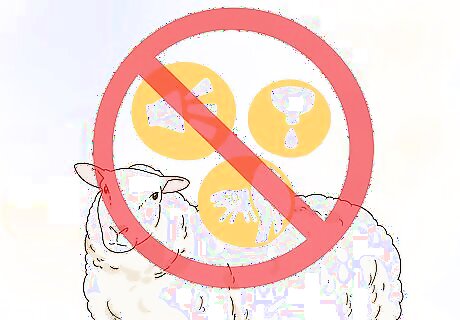
Try to keep stress to a minimum. Animals that are constantly stressed because of transportation, birthing, or heavy milking are more prone to disease. If you know that a sheep is going to be susceptible to these sorts of circumstances, make sure you monitor your animal carefully.
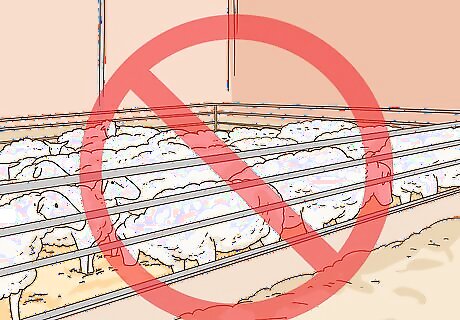
Prevent overcrowding in your herd. Sheep that are kept in cramped and overcrowded conditions are much more likely to develop and spread diseases like pneumonia. Make sure that they have adequate room to move around and eat as well as access to plenty of fresh air.


















Comments
0 comment